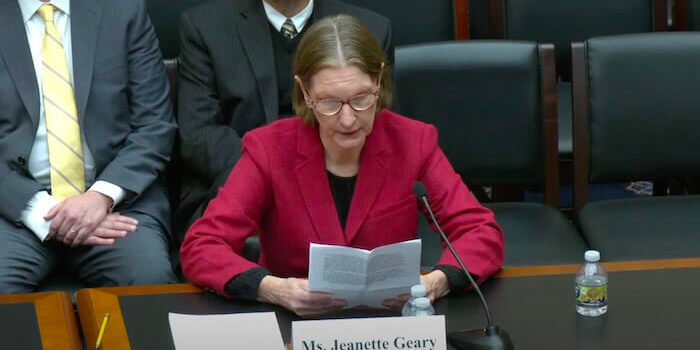(Ken Silva, Headline USA) The House Subcommittee on Health, Employment, Labor and Pensions held a hearing Thursday on legislation that would protect workers from being forced to pay dues or fees to labor unions as a condition of employment.
Proponents of such legislation have been making the economic case for the “right to work” for years—pointing to the fact that states prohibiting mandatory union membership consistently outpace non-Right to Work states in manufacturing output and GDP growth.
And at Thursday’s hearing, lawmakers heard personal stories about how the current U.S. labor system has allowed unions to bully nurses and other workers.
Retired nurse Jeanette Geary told the committee that she once worked at a Kent Hospital in Rhode Island. There, the United Nurses & Allied Professionals demanded that she pay dues to the union or be fired.
Geary said she attempted to invoke her rights established under the Supreme Court case CWA v. Beck, which restricted unions from collecting dues for political activities if a union member chooses to opt out.
However, “the union refused to acknowledge me, belittled me, and refused to provide any audited financial disclosure about what it did with the compulsory dues it forcibly extracted from my salary,” Geary said Thursday.
In late 2009, Geary and several other Kent Hospital nurses resigned their UNAP memberships and objected to paying for the union’s political and non-representational activities.
Represented by the National Right to Work Legal Defense Foundation, she initiated an unfair labor practice charge against UNAP with the National Labor Relations Board on November 23, 2009.
A decade-plus legal battle ensued.
After numerous disputes in multiple legal jurisdictions, Geary eventually received back pay for the dues that had been illegally seized from her eleven years earlier.
However, the harrowing process illustrates how broken the current system is, she said.
“The Beck objection system is broken and does not protect employees’ rights. Unions do not tell employees about their rights because union officials have no incentive to do so, and regular employees without lawyers like those at the National Right to Work Legal Foundation are left to fend for themselves,” she said.
“For all of these reasons, I wholeheartedly support the National Right to Work Act, so that no employee will be forced to pay his or her heard earned money to a private organization they do not support,” she added.
“This is America, and membership in a union and payment of dues should be strictly voluntary.”
While Thursday’s hearing focused on legislation that would reduce unions’ power to coerce workers, congressional Democrats are working in the opposite direction.
Left-leaning lawmakers, including Sen. Bernie Sanders, I-Vt., and Rep. Robert Scott, D-Va., have reintroduced the Protecting the Right to Organize Act, which would eliminate every single state Right to Work law in America.
National Right to Work Committee’s vice president of legislation, Greg Mourad, said that luckily, the PRO Act has little chance of making it through this Congress. Voting for this “ridiculous big labor idea” would be political suicide for Democrats in Right to Work states, according to Mourad.
“If they could actually pass it, they might make that sacrifice. But they’re not going to cut their own throats for no reason,” he told Headline USA in June.
Ken Silva is a staff writer at Headline USA. Follow him at twitter.com/jd_cashless.

